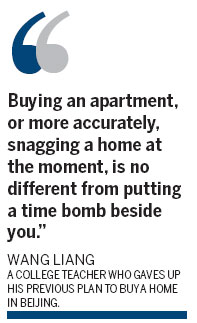China's real estate time bomb ticking

For people on average incomes in Beijing and Shanghai, a regular two-bedroom apartment may cost them 20 to 30 years' income, far higher than the international average of six years. In a healthy market, landlords can reach the break-even point after receiving rents for 16 to 25 years. But in Beijing and Shanghai, they need 36 to 42 years to get the cost back, according to China Index Academy, a real estate research institute. Those figures, however, are at a more reasonable level in the country's second- and third-tier cities.
"Buying an apartment, or more accurately, snagging a home at the moment, is no different from putting a time bomb beside you," said Wang Liang, a college teacher who gives up his previous plan to buy a home in Beijing.
Now the question is when the bubble will burst? How seriously could this hurt the economy at large? And can this "time bomb" be safely removed?
According to an online timetable that is quite popular among netizens, China's real estate sector is likely to encounter a big crash next year, comparing similar phenomena in the country from 2005 to 2008 with that in Japan between 1985 to 1991, such as almost 10 percent economic growth, high reliance on exports, huge pressure for currency appreciation and soaring property prices.
However, industry experts said the forecast doesn't hold water, as China and Japan differ greatly in terms of their demographic structure, and the banking system.
"I don't see the possibility of such a burst in China," said Danny Ma, senior director of CBRE Research China, citing the different stage of urbanization as an important factor.
When Japan's bubble burst in 1985, the urbanization rate in the island country had hit 75.7 percent. So, real-estate prices rose without real demand for houses related to urbanization. But in China today, the figure is still around 45 percent, thus the property market remains shored up by the rapid urbanization process, he explained.
According to a paper co-written by four economists at the Bank of Japan (BOJ), Japan's experiences show the extent of property-market adjustment differs depending on the stage of economic development.
"Given its high potential growth and low leverage, China is unlikely suffer a severe property market adjustment, like the one Japan experienced in the 1990s," the economists said. Moreover, any property-market bust following the current boom may prove temporary, given China's stage of economic development, they say.
For Wang Tao, head of China economic research at UBS, the biggest difference between these two countries is that China is still at a low stage of development. So, if there is a big correction, it still has the potential to grow out of it.
"If the government takes chance and effective measures, history will not be repeated. And I believe the Chinese government has a great ability to prevent such a bubble from bursting," said Shen Jianguang, deputy research head of CICC Hong Kong.
The central government has raised the required downpayment for Chinese people to buy their second homes from the existing 40 percent to 50 percent, as the latest measure to curb soaring property prices and prevent growing financial risks.
Liu Mingkang, chairman of the China Banking Regulatory Commission, said at the recently concluded Boao Forum for Asia that the banking system has plenty of ways to deal with risks arising from the property sector's downside pressure.
Meanwhile, industry sources said a new tax, which is quite similar to the property tax, will soon be levied in some cities on a pilot basis, aiming to increase the cost of holding more than one properties and prevent speculation. The Ministry of Land and Resources announced on Thursday that it will allocate 180,000 hectares of land to build residential housing in 2010, more than double the figure last year.
"All these measures, if soundly implemented, will effectively prevent property prices in some cities from skyrocketing further. And a soft landing of the real estate market could be expected," said Qi Fan, an analyst with US real estate brokerage firm Century 21.
 0
0 






